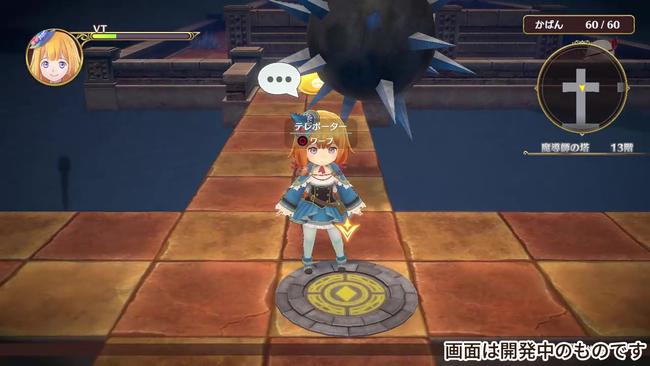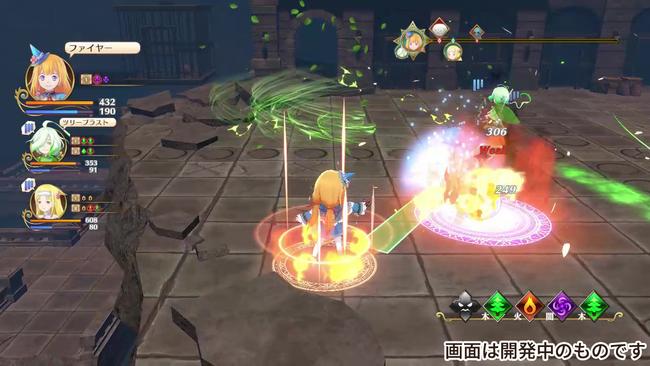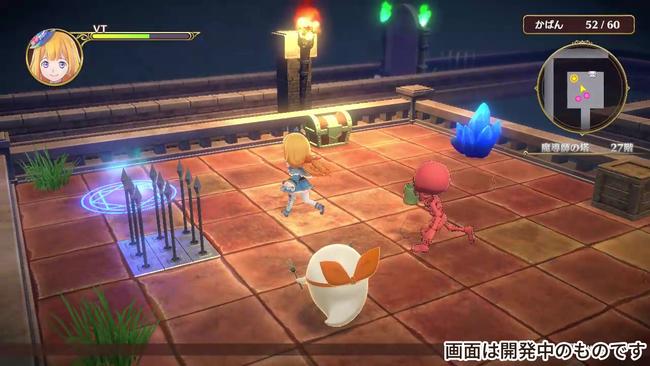
Madou Monogatari: Fia to Fushigi na Gakkou is too promising to not get localized - hands-on preview
We reported earlier this month that Madou Monogatari: Fia to Fushigi na Gakkou would be playable at this year's Tokyo Game Show, and in-between our appointments we had scheduled I personally wanted to make sure to give it a shot; I'm a big fan of Mystery Dungeon style games, if it wasn't already obvious, and I was especially curious to see how the game's realtime dungeon crawling would work out in practice. Funnily enough, the Nintendo Switch ports of the Sting-developed Utawarerumono Trilogy and this new "Sorcery Saga" were on display right next to each other at the same shared booth during the show.
The same demo was showcased on both PlayStation 5 and Nintendo Switch; and immediately it's obvious that the game targets 60 FPS on PlayStation 5, while it's only hitting 30 FPS on Switch. Normally that wouldn't be a major concern for me with a Mystery Dungeon title, but since this one is mostly realtime I'd immediately rather play the game on PlayStation - even if portability is a very important factor for me when it comes to Mystery Dungeon titles as well. With no PC version announced as of yet, if you want to play the game portably, you'll have to deal with the compromise.

As for gameplay - while traversing the dungeon, Fia moves in realtime. You can even find items that you can use that will buff her movement speed by a considerable degree for a limited period of time. While you of course have to consider your party member's HP between battles, moving around, taking damage and the like will also drain your Vitality - requiring you to find items, predominantly food from what we noticed, to replenish it. Find the teleporter on a floor to progress. So far, it's all very standard Mystery Dungeon stuff - where things get interesting is when battles start.
Interacting with enemies on the field starts an instanced battle, transporting your party and the enemies to a separate arena to fight in. While moving around the dungeon is best described as realtime, battles are closer to ATB; you can move at any time, target specific enemies, and even whack them with your staff without limitation. However, you're only able to use spells once Fia has reached the end of the battle timeline as seen in the corner. Using the same type of spells as your allies will gradually add spell charges to an additional bar that will build up your Fever and can be expended to use especially powerful Great Magics that can deal extra damage, and might offer extra effects.

It's hard to get a major grasp of combat as a whole. It's hard to tell exactly where the demo took place in the game's story, if it even directly correlated to actual content at all to begin with. Combat, at least at first glance, feels like it targets a nice blend of simplicity and mastery. When using a spell, you can see the spell circle that denotes its range in front of you; if multiple enemies are within the circle when your spell goes off, you can hit multiple of them at once. This requires you to actively target enemies beyond just locking on, of course - and if the enemy you're targeting isn't in the spell circle, you'll miss them entirely. Alternatively, you can try and dodge enemy attacks in much the same way by running away; a useful tactic if multiple party members might have otherwise ended up clipped by an attack.
Dungeons are full of traps. Spikes, swinging axes, and of course enemies around every corner. Maybe you'll find a section locked off, that requires you to find and bring a key to unlock it? Even outside of immediately usable items, we found things that can clearly be used after returning to Fia's school, too. With such a limited taste of the gameplay, it really is impossible to say for sure yet how the overall Mystery Dungeon design will feel in the long run; but so far it's an interesting first expression, at least.

I'm not one to get excited for Compile Heart projects these days; not since the incident. However, I'm more than willing to make an exception for something like Madou Monogatari. It's a series with a pedigree, and at least so far it feels like Sting and Compile Heart recognize that necessitates a certain degree of care and attention. Maybe with a more complete grasp of the game I'll feel differently - but for now, I'm optimistic. It's been over a decade since the last Madou Monogatari, and it feels good to see some genuinely different game mechanics on display here.
Put another way - I want to be pleasantly surprised. The last time Compile Heart and Sting worked together, the result was better than I expected. I can hope for the same here when Madou Monogatari: Fia to Fushigi na Gakkou launches in Japan for PlayStation 4, PlayStation 5 and Nintendo Switch on November 28.